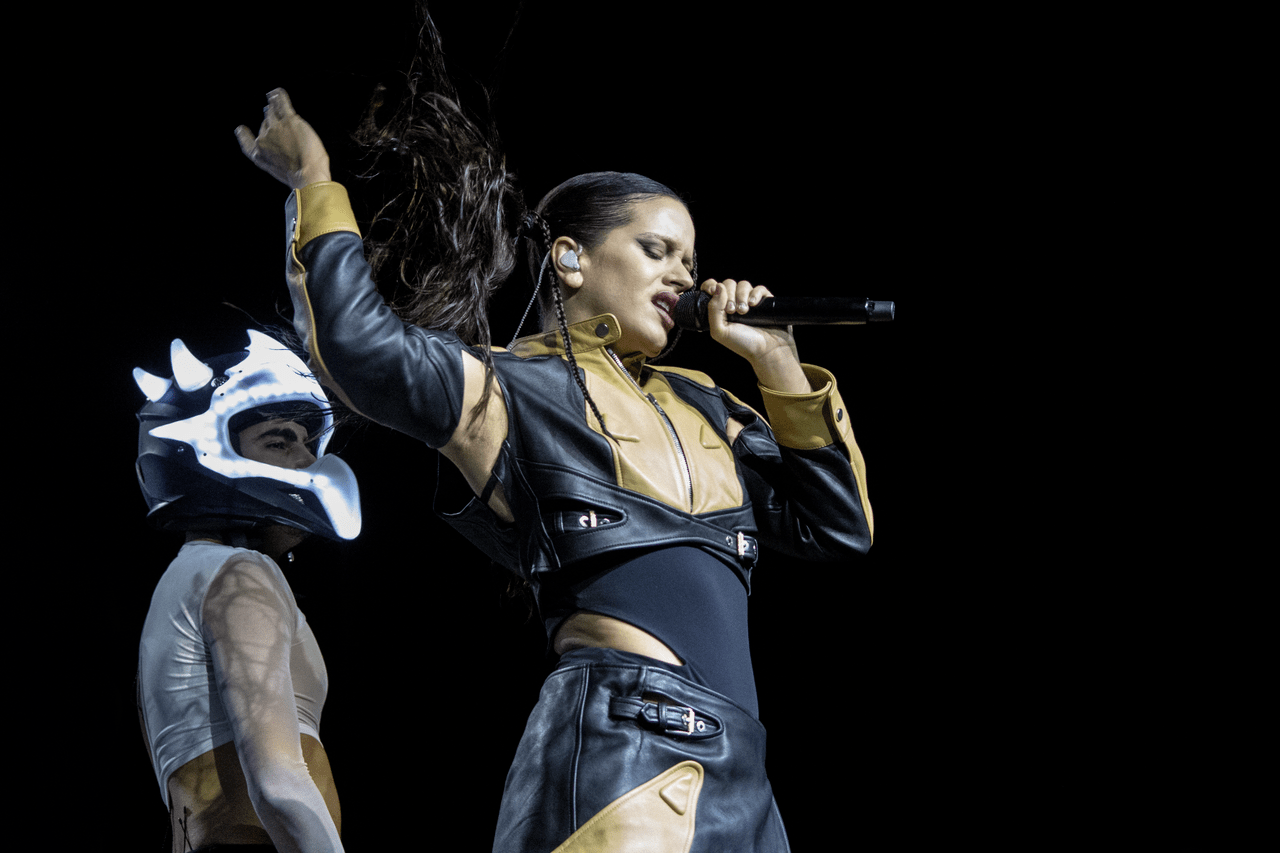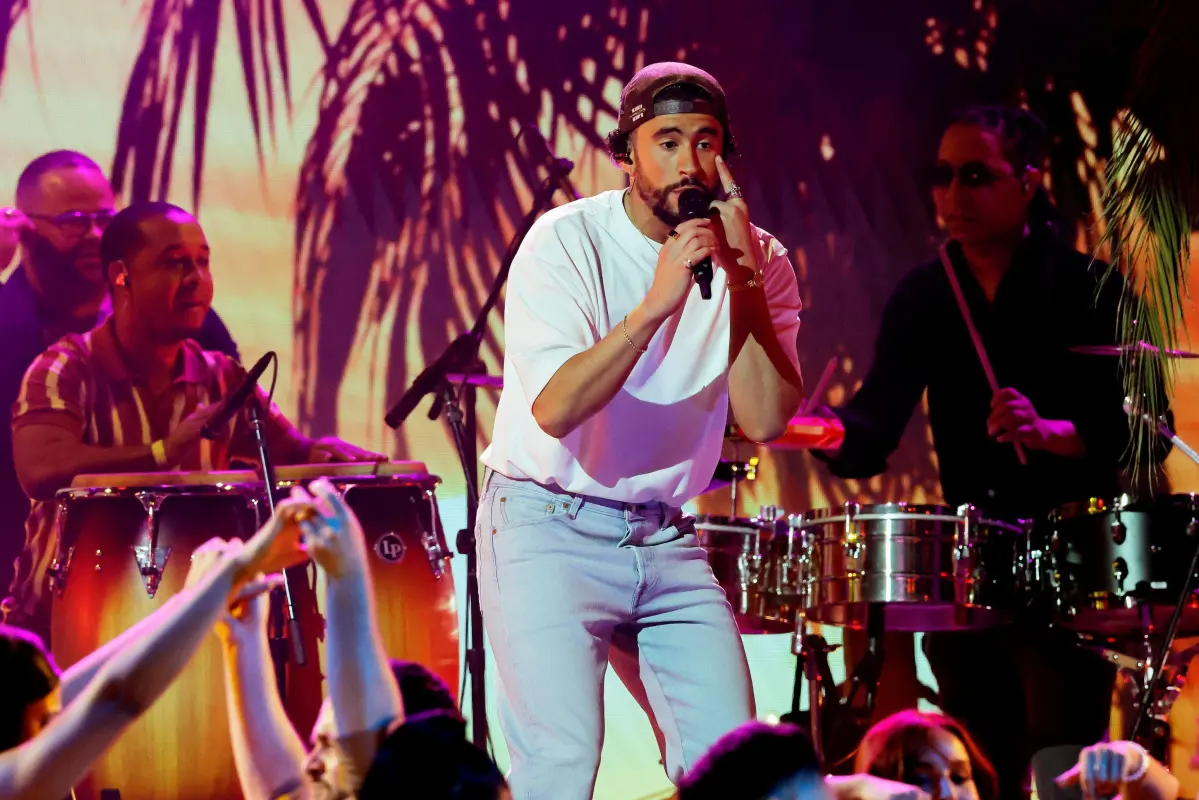There was already controversy after the 23rd Annual Latin Grammys, when Spanish artist, Rosalía, took home Album of the Year, Best Alternative Music Album, and Best Recording Package for her album, Motomami.
Controversy because Bad Bunny, who was also nominated in the category for his album, Un Verano Sin Ti, is 1) actually from Latin America, and 2) outsold and had more of a global impact than Rosalía, including in her home country.
Obviously, popularity doesn’t necessarily equal quality, but as Pitchfork put it, Spain “which colonized most of the region in the 15th and 16th centuries—has long held outsized influence in the Latin Grammys and the Latin music industry at large.” Even when Latine artists are rewarded, there are traces of colorism and racism in the Latin Recording Academy’s selections
Now, as reported by NBC News, the 24th Annual Latin Grammys in November will be held outside the U.S. for the first time—in Spain. And that kinda feels like a slap in the face.
So what’s the big deal?

First, some clarification. In an interview with KCRW, L.A. Times columnist Suzy Exposito “notes that to qualify for a Latin Grammy nomination, an artist does not have to be from Latin America. Their entry just has to contain 51% of lyrics in Spanish, Portuguese, or an accepted language/dialect, and it must be a new song.”
And perhaps that’s the larger problem. There’s a reason it’s the Latin Grammys. Not the “Hispanic Grammys” (which refers to all countries/cultures that speak Spanish, including Spain), or the “Spanish/Portuguese Grammys.”
When we talk about Latine cultures (and music), we’re not referring to all Spanish-speaking or Portuguese-speaking cultures, or talking about Spain or Portugal at all. Latine cultures are separate from Spanish or Portuguese culture and are not just about being “Spanish/Portuguese-speaking.”
These cultures, to varying degrees, are the product of Indigenous cultures of South America, as well as African cultures, as much as of Spanish or Portuguese influence, thanks to the one-two punch horror shows that were European colonization and the Transatlantic Slave Trade.
Latine music as a genre, then, is historically a reflection of different countries’ responses to, and emancipation from, colonialism.
And now, this celebration of Latine music is basically being moved to the home of one of the OG colonizers. Can you see why some Latine might be upset about that?
But wait … is that ‘Latinidad?’

It bears repeating that no group is a monolith and that even the broad outline of “what Latine cultures are” that I give above doesn’t sit well with all of us.
In an incisive piece over at Refinery29, Michelle Santiago Cortés dissects the idea that Rosalía “not being Latina” says more about our incomplete view of what Latinidad is than anything else. She writes:
“Anyone that’s given Latinidad any serious thought…will find that no matter how we define Latinidad, it doesn’t hold up to much scrutiny. Is it defined by a shared colonizer? A geographic designation? A shared language? Not exactly. […] While, yes, it represents a relationship, it does so by distorting many other relationships. If I say I am Latinx, that tells you I am from a not-so-specific part of the world and that my European, Indigenous, and/or African ancestors at some point converged in, were forcibly brought to, or were erased from said part of the world. The term’s very existence erases Black and Indigenous people by affirming the myth that we’re all “a little bit of everything.” […] The only thing that binds Latinidad into any one word is the trail of blood the Spanish Empire (but also the French and Portuguese!) left behind. It makes sense then that so many Chicanx, Caribbean, and other peoples have divested from the identity altogether. Maybe we should let the colonizers have it.”
While I disagree that the idea that we’re “a little bit of everything” is a myth (every culture is a blend of people over time, whether colonized or not), I absolutely agree with the idea that even identifying as Latine (or Latinx, or Latino/a) might not be doing the job an individual, or a community, wants it to do.
Apparently, a former colonizer needs bailing out

In the KCRW piece, Exposito explains that:
“Spain struggled for years to retain its young people and to keep them employed. … In the interest of trying to keep unemployment down, the country has invested a lot of money in music tourism. … And bringing the Latin Grammys to Spain, the Andalusian government has actually projected a revenue of €500 million, which translates to $530 million over the course of the years 2023 and 2025. […] I think this was a deal that took years to negotiate, and one that came with state sponsorship. So I think that’s really key in talking about why the Latin Grammys are being held in Spain.”
So … Spain has been struggling financially. And since the Latin Recording Academy has continually been rewarding “one of Spain’s biggest exports,” they are willing to go all the way in ingratiating themselves to their former Motherland by allowing Spain, once again, to profit from the cultures of their former colonies.
The Rosalía thing
TikTok user, @gordacorajuda, gives an excellent rundown of why Rosalía being honored over Bad Bunny is so problematic. As she says, it’s not only that Rosalía is from Spain. It’s that “her career didn’t start taking off until she started doing reggaeton, which is a Latino genre. That’s when people were like ‘Hey, it’s cool that you appreciate the music, but you shouldn’t be getting recognized over actual Latinos doing reggaeton.'”
She goes on to explain:
“That’s when she started doing the whole BS thing of ‘Oh, I feel Latina. I just really appreciate the culture.’ Then her and her fans were like, ‘There’s enough room for everyone in reggaetón.’ But as she continued to get bigger, she started to win a lot of awards in reggaetón over actual Latines. And that’s why people keep saying, ‘You as a European are taking up way too much space in this genre.'”
Friends, this is the textbook definition of appropriation. It goes beyond “appreciating” the culture and dives head-first into profiting from it, be it financially or socially.
It’s not about Rosalía. It’s about the Latin music industry

A WBUR piece on Bad Bunny from 2022 discusses the reasons for his success—one of the biggest of which is that Bad Bunny’s music is unapologetically Puerto Rican. He uses Puerto Rican Spanish in his songs and makes reggaetón, which was popularized there. In being so unapologetically specific, he’s given the world something new and exciting that they’ve never experienced before, but want more of.
And, naturally, want to capitalize on. The WBUR piece mentions that “Now, Puerto Rican Spanish is used across the urban Latin genre by artists such as Rosalía and J Balvin.”
Cortés takes it further, pointing out the systemic racism in the industry. She says assuming that individual artists “take advantage” of the music of oppressed people assumes that the industry itself cares about Black and brown people, which it does not:
“It’s never been about a few sly individuals who have calculated that it’s beneficial to blur the lines. Rather, it’s about a whole system that only banks on white faces to sell primarily Black art. Rosalía found her way into the Latin music market thanks to white Colombian artists like Juanes and J Balvin. She didn’t parachute into Latin America looking to cosplay as Latina; she followed a well-worn path and was received by many with open arms.”
Spanish artists like Rosalía winning awards isn’t the fault of the artists. It’s the fault of a system that prioritizes whiteness and proximity to Europe.
The Latin Recording Academy has prioritized that proximity once again by bringing its biggest show to Spain, rather than bringing that financial boon to Puerto Rico (where the world’s biggest artist right now is from) or to Mexico (where the largest Latine group in mainland U.S. is from).
Will it be Portugal in 2026, Academy? Sheesh.
(featured image: Kevin Winter/Getty Images)








